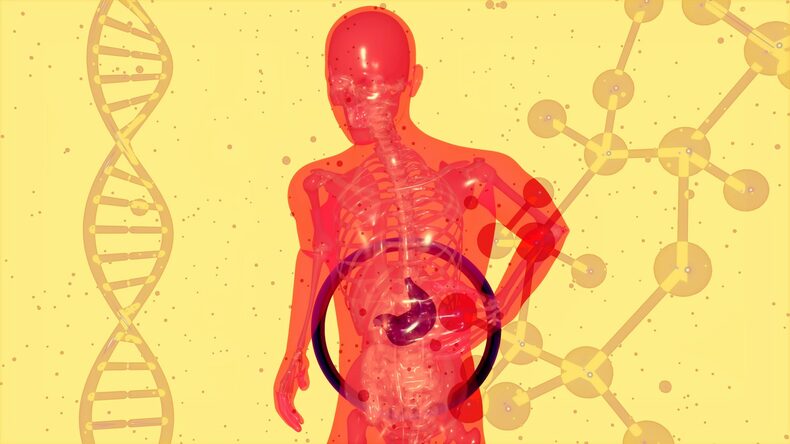At least 13% of all cancers worldwide are caused by viral and bacterial infections, according to a recent report from the American Association for Cancer Research.
We can reduce the risk of contracting cancer “make healthy decisions”. This is what they assure Centers for Disease Control and Prevention (CDC) since smoking, alcoholism and obesity, among other conditions, can be triggers of this disease.
However, Some types of cancer are caused by bacterial and viral infections.
According to a recent report from American Association for Cancer Research , These types of infections account for approximately 13% of all cancer cases worldwide.
This does not mean that being infected with one of these infections automatically develops the disease; however, poor or no treatment or late detection can significantly increase risks.
The same document explained, for example, that Most cases of stomach cancer are caused by bacteria, and most cancers of the cervix, genitals, and mouth are caused by viruses.
With this in mind, they identified the three types of infections that can cause cancer. This, according to the professor of medicine of Duke Medical School Michael Pignone, could bring humanity closer to “transforming what would once have been common cancers into rare diseases.”
And that’s it Early detection and correct treatment of these infections could prevent thousands of cancers worldwide.

1. Human papillomavirus
As explained in an article from The New York Times , There are more than 200 types of human papillomavirus (HPV) and among them, at least a dozen significantly increase the risk of cervical, genital and oral cancer.
Men and women usually “clear” the virus on their own, but it is thought that About 10% of women infected with HPV in the cervix will develop a “high-risk persistent infection.” Denise Galloway, a doctor at the Fred Hutch Cancer Center in Washington, United States, told the same media outlet.
This is why using a condom is important because it can protect against HPV infection and, in addition, there is a vaccine with higher protection rates so much so that a vaccinated young person will have a risk of contagion equivalent to zero.
In addition, Women should have regular gynecological visits and have a Pap test because thanks to it, the infection can be detected early and effective treatment can be provided to prevent HPV from turning into cancer.

2. Hepatitis B and C
When a person gets hepatitis B or C, the viruses inflame liver cells. This is how cancer is caused by this contagion, according to Dr. Sunyoung Lee, gastrointestinal oncologist at MD Anderson Cancer Center in Texas.
In conversation with New York Timesthe expert explained that Chronic inflammation of the liver “leads to a buildup of scar tissue in the liver, called cirrhosis, which is a major risk factor for cancer.”
“In some cases, Hepatitis B can also cause cancer directly, by disrupting healthy liver cells.
Both infections are transmitted through contact with blood, semen, body fluids and, in particular, hepatitis B can be transmitted from mother to baby. For the latter, pregnant women must be screened (a blood test is sufficient).
Currently, There is no vaccine against hepatitis C, but not against hepatitis B: In the United States, vaccination is recommended for infants and adults under 60 years of age who have not been vaccinated and have risk factors.
Concerning hepatitis B, it can be an acute and benign infection, but become chronic. Doctors often recommend antiviral treatments and a protein to boost the immune system to help it beat the infection.
NeverthelessThe hepatitis C situation is more complicated, because infected people can take years to receive treatment. During this time, liver damage becomes serious and the risks of liver cancer increase.
According to Dr. Lee, “Patients often go years without receiving treatment, either because “They don’t realize their infection is serious and requires treatment, or because they lose contact with the health system.”

3. Helicobacter pylori
Millions of people live with Helicobacter pylori bacteria in their stomach without knowing it. It is estimated that about half of the world’s population carries this bacteria, which sometimes causes uncomfortable digestive symptoms.
Nina Salama, from Fred Hutch Cancer Center explained that among all those infected, Between 1 and 3% will develop cancer caused by the H. pylori bacteria.
This bacteria is usually found in the saliva, plaque, and stool of infected people. contagion generally occurs “through close household contact or living in crowded living spaces.”
Once infected, a person is likely to begin to suffer from chronic inflammation of the stomach lining and, like many cancers, stomach cancer “benefits” from this inflammation.

Furthermore, as the expert explained to The New York Times, Bacteria can introduce “toxic proteins” into cells and cause mutations that could also trigger cancer.
To prevent this very common infection, Salama urged Within a family, “avoid sharing eating utensils, glasses and toothbrushes. Also wash your hands thoroughly with soap and water for at least 20 seconds before preparing or eating food. as well as after going to the toilet.
If a person experiences stomach pain, blood in the stool or suspects ulcers, It is important that you see a doctor and get tested for the bacteria before it can cause cancer.
Source: Latercera
I am David Jack and I have been working in the news industry for over 10 years. As an experienced journalist, I specialize in covering sports news with a focus on golf. My articles have been published by some of the most respected publications in the world including The New York Times and Sports Illustrated.


